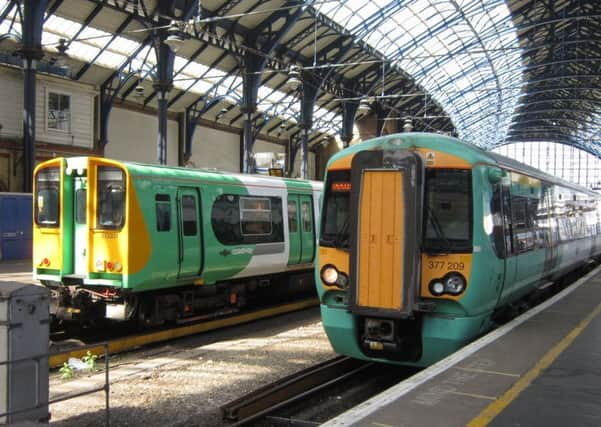Train passengers hit with ticket price rises


The average cost of regulated rail fares across the country has risen by 3.4 per cent in line with the Retail Prince Index measure of inflation from last July.
Some commuters have seen their season tickets increase by around £100 a year.
Advertisement
Hide AdAdvertisement
Hide AdThe Rail Delivery Group, which brings together train operators and Network Rail, suggested that 97p in every pound goes directly back to operating and investing in services.
But the RMT union, which is due to hold its latest strike on Monday January 8 over the further extension of driver-only operation on Southern services, claimed passengers were paying more for ‘less and less’.
Mick Cash, general secretary of the RMT, said: “Our members will be protesting to today to say it is time to cut our fares not our staff and for a publicly owned railway where every penny of passenger revenue goes to improving services.”
Meanwhile Mick Whelan, general secretary of train drivers’ union ASLEF, added: “Passengers are paying the penalty fare for privatisation, a flawed and failing model that everyone in the rail industry can see doesn’t work.”
Advertisement
Hide AdAdvertisement
Hide AdBut a spokesman for Govia Thameslink Railway, which runs Southern, Thameslink and Gatwick Express services, said: “As we continue to modernise the railway to give passengers faster, more frequent and more reliable journeys, fares on Thameslink, Great Northern, Southern, and Gatwick Express services will rise by less than the rate of inflation, by an average of 3.33 per cent.
“Southern’s great value cheapest advance fare between London and the coast has been frozen at £5 for the tenth year running, saving over 40 per cent on a super off peak ticket, and the Gatwick Express single fare has been frozen for the 5th year running.
“Accompanied child flat fares are still £2 (half the price of that offered in many other parts of the country) and our DaySave rate has risen only 2.6 per cent.”
Paul Plummer, chief executive of the Rail Delivery Group, added: “On average, fares will rise by less than inflation this year.
Advertisement
Hide AdAdvertisement
Hide Ad“For every pound paid in fares, 97p goes directly back to operating and improving services and, with more people travelling, that means more money for investment by the private and public partnership railway to build the better network Britain needs.
“Working together in partnership across the industry and with government our long-term plan to improve will secure £85bn of additional economic benefits while enabling further investment and improvement for customers, communities and our people.
“Over the next 18 months alone the country will see an unprecedented transformation in rail services, including dramatic improvements across the Thameslink network and through the Great North Rail Project.”
The average increase of 3.4 per cent in regulated fares, which comprise about half of all tickets, is the highest since 2013.
Advertisement
Hide AdAdvertisement
Hide AdSouthern rail passengers faced repeated misery due to delays and cancellations from late 2015 through to midway through 2017 due to infrastructure issues experienced by Network Rail, industrial action, management problems, and staff shortages.
Although performance dramatically improved last summer, between October and December 2017 the reliability of Southern services has dipped again.
The Public Performance Measure (PPM) looks at the percentage of planned train services that arrive at their final destination less than five minutes late.
Between mid October and mid November this figure for Southern was 72 per cent, and in the month up to mid December it was 72.6 per cent.
Advertisement
Hide AdAdvertisement
Hide AdAccording to research by the Southern Policy Centre, a think tank and policy forum for central and southern England, fares paid by rail passengers are effectively subsidising train services in other parts of the country.
They claim that Southern rail passengers paid 10.5p per mile more than the cost of running the service in 2015-16.
John Denham, chair of the Southern Policy Centre said: “Rail passengers in the south are not only being asked to pay for their own rail journeys, but are being forced to subsidise rail services across the rest of England, Scotland and Wales.
“There may well be a good case for subsidising some services but, if there is, surely the cost should fall on taxpayers as a whole, not just on one group of passengers in one small part of the country?
Advertisement
Hide AdAdvertisement
Hide Ad“If local passengers were treated fairly, the cost of their season ticket would be falling, not rising.”
Andy McDonald, Labour’s Shadow Transport Secretary, said: “Privatisation has been a disaster but there is another way.
“Instead of stuffing the pockets of private train companies Labour will bring our railways back into public ownership.
“Instead of public money being leeched by private shareholders it will be used to end inflation busting fare rises, keep travel affordable and upgrade services, so they work for the many, not the few.”
Advertisement
Hide AdAdvertisement
Hide AdBut a report from pressure group Taxpayers’ Alliance suggests privatisation has benefitted commuters and taxpayers.
It claims that two-thirds of delays are caused by Network Rail, which is nationalised, passenger journeys have increased since privatisation every year but one, and passenger satisfaction is high at 83 per cent.
The group argues that lower fares could only be delivered by increasing taxpayer support, which would disproportionately benefit higher earners, as the top fifth of households travel six times as far by rail as those in the bottom 20 per cent.
John O’Connell, chief executive at the TaxPayers’ Alliance, said: “Whilst we hear from some on the left that renationalisation is the only way to improve the railways, the evidence clearly points in the opposite direction.
Advertisement
Hide AdAdvertisement
Hide Ad“Dividend payments from the private companies are very small, whilst investment is very high, and the only way to significantly lower fares would be to make taxpayers subsidise them.”
Have you seen the price of your ticket rise? Email the newsdesk.